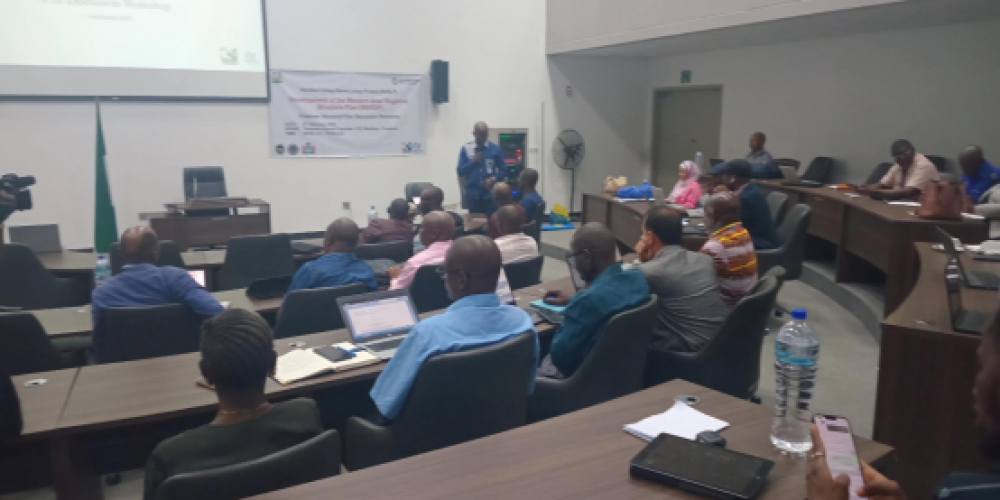By Expo Times Correspondent
The Ministry of Lands, with support from the World Bank and in collaboration with key stakeholders, including the Ministry of Finance, Freetown City Council amongst others, has organized a two-day Freetown Structural Plan Discussion Workshop. The event, held at the Freetown City Council Chamber, focused on the development of the Western Area Regional Structure Plan (WARSP) under the Resilient Urban Sierra Leone Project (RUSLP).
The workshop aimed to foster discussions on policies and strategies that will shape Freetown’s future. Key topics included developing an efficient transportation system, improving public services, and implementing necessary regulations to align with the city’s long-term goals.
The event brought together government officials, local authorities, community leaders, private sector representatives, and development partners.
Giving an overview of the project, Sahr Mark Kanawa, Director of Country Planning, Ministry of Lands, Housing & Country Planning, emphasized the importance of structural planning for secondary cities across Sierra Leone. He highlighted the completion of a special development plan, demonstrating a commitment to community-level planning and addressing key urban challenges.
He also stressed the need to update the data structure plan to reflect current issues and future growth strategies. The revised plan aims to tackle the increasing formalization of settlements, environmental risks, and infrastructure demands through a forward-thinking and inclusive approach.
Kanawa revealed that the project is being executed under the Ministry of Finance, with the World Bank as a key partner. He listed the principal agencies involved, including: the Ministry of Local Government, the Ministry of Environment and Climate Change, the National Disaster Management Agency (NDMA), the Environmental Protection Agency (EPA), the Sierra Leone Meteorological Services (SMS), the National Water Resources Board (NWRB), the Sierra Leone Institute (SLI)
He explained that the project focuses on urban planning, with instruments such as the Structure Plan for Freetown and secondary cities being developed and updated. Additionally, he announced the completion of a city development plan and the launch of a municipal property tax to help the council generate revenue.
Speaking on behalf of the Mayor of Freetown, Councillor Dabor expressed satisfaction with the project’s progress and its alignment with the municipal property tax initiative. He noted that the tax is directly linked to the special plan and will enable the council to raise revenue for urban development.
Heba Khalili, Team-lead, VisionR, in her presentation, highlighted the selection of seven joint city areas based on their high population density (over 8,000 persons per area). She emphasized the role of tourism in these regions and noted that the Freetown Western Regional Plan is nearly complete, with efforts now shifting to the finalization of the Freetown Structure Plan, originally drafted in 2014.
She pointed out that the growth of informal settlements remains a significant challenge that was not adequately addressed in the 2014 plan. Moving forward, the project will focus on holistic and sustainable solutions to improve living conditions and opportunities in Freetown, particularly over the next two to three years.
Khalili revealed that the project operates on a regional scale, considering land use, population projections, and economic opportunities. To better understand urban challenges, a household survey of 750 samples was conducted, analyzing socioeconomic profiles, environmental services, housing incentives, and transportation access.
Key findings indicate a housing demand for an additional 20,000 units. The project aims to map 68 settlements, identify areas for upgrading, and provide low-income housing solutions while addressing high interest rates on mortgages.
Regarding infrastructure, the project includes: New sanitation facilities and an integrated sanitation network, expanded water supply methods to address shortages, and upgraded infrastructure to improve service delivery.
The speaker emphasized the importance of stakeholder feedback in shaping the project’s direction. The initiative seeks to balance the needs of various groups, including the private sector, local councils, and community representatives.
The project incorporates both long-term and short-term solutions to address Freetown’s urban challenges. Importantly, all plans are being co-designed with stakeholders to ensure they meet the city’s evolving needs.
As discussions continue, stakeholders remain committed to developing a resilient, inclusive, and well-planned Freetown that can adapt to rapid urbanization, environmental risks, and infrastructure demands in the years to come.





